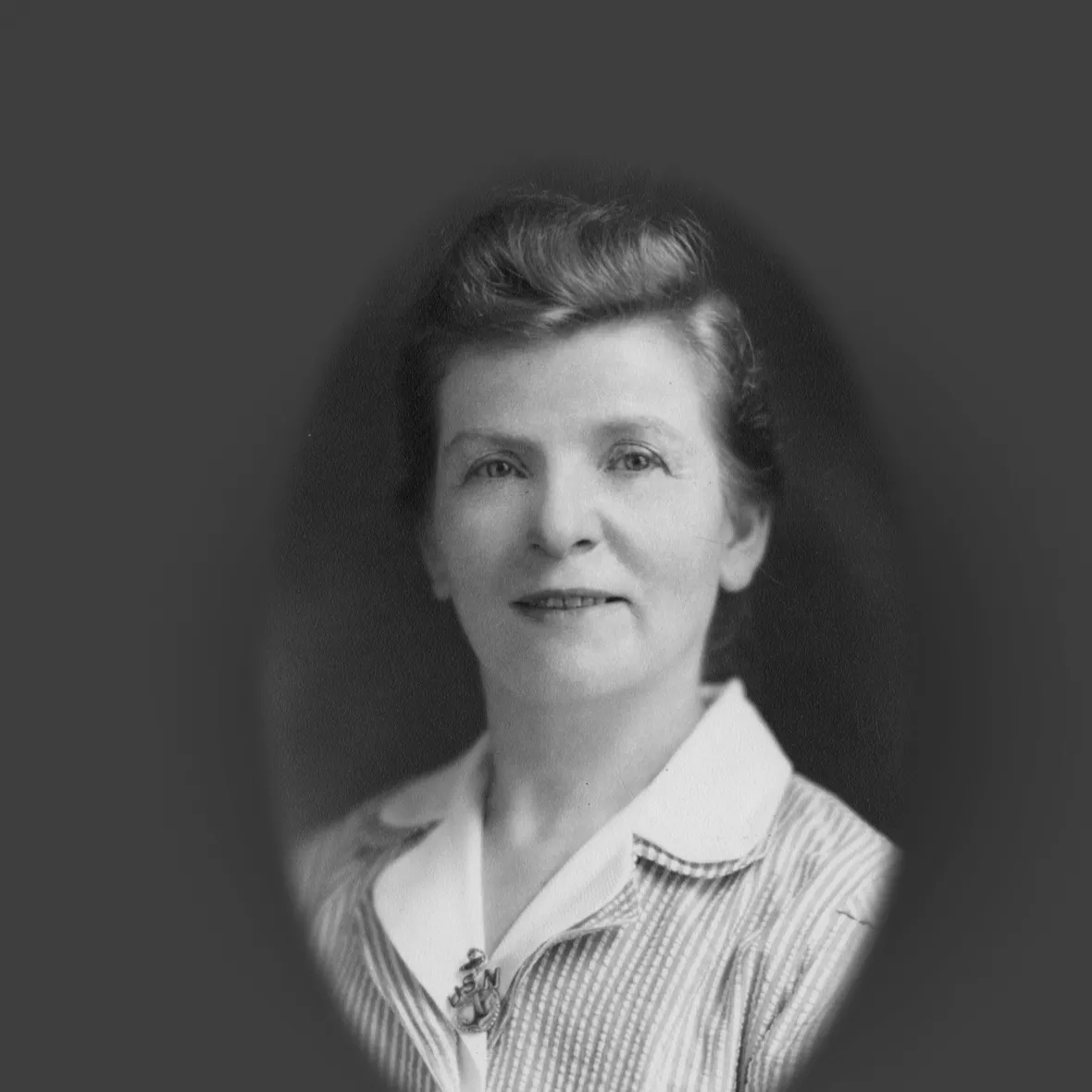 View All Honorees
View All Honorees
Columbia City of Women Honoree
Clara Kligerman Baker
Clara Kligerman Baker, circa 1940. Image courtesy Larraine Lourie Moses
Momma strongly believed her customers needed her. Until she sold the store to Oscar in 1967 – she was at least 70 then, she opened the store by 7 a.m. and stayed until sundown every day of the week. During those early years when business was slow, she often kept the doors open until midnight on the weekends. ‘They don’t have ‘frigerators and they need breakfast food.’
– Toby Baker Lourie, in “Clara Kligerman Baker: Personal Remembrances of Her Life,” 1974.
“Miz Clara Baker” operated a small grocery in the predominantly Black Ward One neighborhood for more than 40 years. Baker’s Grocery was many things to many people: a business where poor Black families could always buy on credit; a community landmark that lent its name to a Black baseball team; and for Clara, a place to put down roots. The store was more than just the Bakers’ primary source of income. It was where the family of six lived for many years, where Clara spent her long days knitting clothes and secretly learning to read and write in English. Baker’s Grocery represented an opportunity for Clara to provide a life and future for her children, a chance denied to most of her family in Russia.
Clara Kligerman was born in Nikolaev, Russia (present-day Ukraine) in 1892 to Ara Lazer Jacob and Alta Belitsky Kligerman. Her father was a successful businessman, in part because most of their neighbors did not realize the family was Jewish. According to her sister, Esther, “About twice a year, there were pogroms against the Jews. The Czar’s men would look for the Jews and tear up their homes. But we’d always put up the picture of Christ in the window and they wouldn’t touch us.” In 1913, the sisters’ aunt and uncle sent for 15-year-old Esther to join them in New York to learn English, but ultimately Clara travelled as well to ensure her younger sister’s safe arrival. What Esther saw as a grand adventure, Clara saw as the loss of everything she’d known, including her parents and other siblings.
Upon their arrival, the Kligermans worked in various factories and took English class at night. Clara also attracted a suitor, widower Frank Baker, who was in town on a buying trip from South Carolina. The couple eventually married in Mount Pleasant in 1917 and operated a store in Estill. Esther visited the couple and soon married Frank’s brother, Jake. Together the sisters funded the immigration of another brother, Louis, in 1925; Clara secretly sold her engagement ring to help pay his passage. Louis, who adopted the Americanized name Kligman, hated small-town life and quickly established a storefront in Columbia, paving the way for his sisters to follow.
Clara and Frank Baker would leave Estill the following year. With their three children (a fourth would follow in 1933), they moved into the two rooms at the back of their rented storefront in Columbia. Although located just four blocks from the orthodox House of Peace Synagogue and its surrounding Jewish community, “C. Baker Grocery” was worlds apart from other Jewish businesses north of Gervais Street. This stretch of Gates Street was synonymous with poverty and even prostitution; the latter proved such an embarrassing problem that the city renamed the “respectable” upper blocks of Gates Park Street. The store’s clientele was largely working-class African Americans.

Although the 1930 Census listed Frank Baker as the owner, the store was Clara’s. Her status as the family’s breadwinner allowed her husband the freedom to tinker. In his lifetime, he patented a machine for roasting and salting peanuts, conceptualized selling frozen, chocolate-covered bananas in the store, and invested a “system of wires and plates that provided music and radio broadcasts within a four-block radius for residents who paid 25 cents per week”—eccentricities that made him beloved by their neighbors until his death in 1941.

Daughter Toby recalled the store as a “marvelous hodgepodge- a meat market, pharmacy, grocery store, mercantile establishment and unofficial community center.” What endeared her mother to the Ward One community the most though, was her love of the neighborhood children. Even today, the store remains central in memories of former residents.

In 1967, Clara sold the grocery and its contents to Oscar Shealy, who had worked beside her for 20 years. Shealy continued to operate the store as Baker's Grocery until it was demolished by 1970 as part of a massive urban renewal project. Today, only two structures from the entire community remain.
Clara Kligerman Baker died in 1969, having lived to see each of her children marry and have children.
Selected References:
Brown, Olivia. “Catering to the Local Trade”: Jewish-Owned Grocery Stores in
Columbia, South Carolina. (Master’s thesis). Retrieved from:
https://scholarcommons.sc.edu/cgi/viewcontent.cgi?article=5786&context=etd
Henderson, Ellen and Toby Baker Lourie, “Clara Kligerman Baker: Personal Remembrances of Her Life,” 1974.
Walden, Laurie Baker. “A March Through Time: Baker Family Roots,” 1999.
From 1926 until 1970, 931 Gates (Park) Street operated as Baker’s Grocery, a non-Kosher store run by Russian immigrant Clara Kligerman Baker. In addition to anchoring the community, Baker also served as the family’s primary breadwinner for the majority of her life. She worked at the store until just three years before her death.